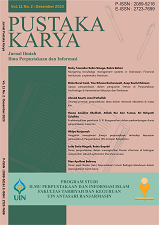Pengaruh manajemen kinerja perpustakaan terhadap kepuasan pemustaka di Perpustakaan UIN Antasari Banjarbaru
DOI:
https://doi.org/10.18592/pk.v11i2.9823Keywords:
Manajemen, Perpustakaan, Kepuasan PemustakaAbstract
The development of the times is marked by various change in various aspects of social life. Libraries, an organization that focuses on serving users, must adapt to developments so as not to be left behind. In serving users, it is of course important to pay attention to library performance management, because it is one of the benchmarks for user satisfaction. Quantitative method, which aims to show the relationship of influence between 2 variables. The population includes active students of UIN Antasari Banjarmasin (campus 2 Banjarbaru ) with a sample of 30 people. Using non probability sampling, namely purposive sampling. By distributing closed questionnaires using a Likert scale. This research is objective and includes quantitative data collection, analysis, and statistical testing with assistance from IBM SPSS Statistics Software 21. this research shows the influence that library performance management has on user satisfaction with an R Square of 72.8% , meaning management library own strong influence to satisfaction user . The influence of library performance management on user satisfaction is 72.8% , while the remaining 27.2% (100% - 72.8%) is influenced by other variables outside this research. So according to Chin (1988) the R-Square value of 72.8% is included in the strong category. Suggestions for future researchers could be to conduct research with a larger sample, because the population of this study is quite a large number of students at UIN Antasari Banjarbaru.References
Basuki, Sulistyo, (1991). Pengantar Ilmu Perpustakaan, Jakarta: Gramedia Pustaka Utama.
Basuki, Sulistyo, (1994). Periodisasi Perpustakaan Indonesia, Bandung: PT Remaja Rosda Karya.
Bidang Pengolahan dan Pengembangan Koleksi,” diakses 28 Maret 2023, https://librarynew.unja.ac.id/bidang-pengolahan-dan-pengembangan-koleksi/.
Darmanto, Priyono, (2016). Manajemen Perpustakaan, Jakarta : BumiAksara.
Effendy, Mochtar, (1986). Manajemen Suatu Pendekatan Berdasarkan Ajaran Islam, Jakarta: PT Bhatara Karya Aksa.
Herlina, (2009). Manajemen Perpustakaan, Palembang: Grafika Telindo Press.
HS, Lasa, (2008). Manajemen Perpustakaan, Yogyakarta: Gama Media.
Holmberg, Kim (2009) “What is Library 2.0?”, article in Journal of Documentation 65 (4), 668-681.
Ibrahim, Andi, (2015). Pengantar Ilmu Perpustakaan Dan Kearsipan, Jakarta: Gunadarma Ilmu.
Iskandar, (2016). Manajemen Dan Budaya Perpustakaan, Bandung: Refika Aditama.
Kautsar, Rahmad, dkk, (2022). “Preservasi Bahan Pustaka di Perpustakaaan Umum Kota Banjarmasin” dalam Jurnal Pustaka Karya, 10 (1), 49-58.
Perpustakaan Nasional RI, Undang-Undang Republik Indonesia No. 43 Tahun 2007 Tentang Perpustakaan.
Purwanggono, Bambang, dkk (2017). “Evaluasi Kualitas Pelayanan Perpustakaan Universitas Diponegoro Untuk Menjamin Kepuasan Pemustaka Dengan Standar Nasional Pepustakaan,” Industrial Engineering Online Journal 6, vol 2, 1-10.
Rahayuningsih, Fransisca, (2015). Mengukur Kepuasan Pemustaka Menggunakan Metode LibQual+TM , Yogyakarta: Graha Ilmu.
S, Noerhayati, (1987). Pengelolaan Perpustakan jilid 1, Bandung: Alumni.
Sugiyon, (2016). Metode Penelitia Kuantitatif dan R&B, Bandung: Alfabeta.
Sutabri, Tata, (2016). Sistem Informasi Manajemen, Yogyakarta: Andi.
Suwarno, Wiji, (2009). Psikologi Perpustakaan, Jakarta: Sagung Seto.
Suwarno, Wiji, (2016). Organisasi Informasi Perpustakaan, Jakarta: Raja Grafindo Persada.
Downloads
Published
How to Cite
Issue
Section
License
Copyright (c) 2023 Widya Norjannah

This work is licensed under a Creative Commons Attribution 4.0 International License.
Copyright (c) Author (s)

Pustaka Karya: Jurnal Ilmiah Ilmu Perpustakaan dan Informasi is licensed under a Creative Commons Attribution 4.0 International License.
- Articles published in Pustaka Karya are licensed under a Creative Commons Attribution 4.0 International License. You are free to copy, transform, or redistribute articles for any lawful purpose in any medium, provided you give appropriate credit to the original author(s) and Pustaka Karya.
- Copyright on articles is retained by the respective author(s), without restrictions. A non-exclusive license is granted to Pustaka Karya to publish the article and identify itself as its original publisher, along with the commercial right to include the article in a hardcopy issue for sale to libraries and individuals.
- By publishing in Pustaka Karya, authors grant any third party the right to use their article to the extent provided by the Creative Commons Attribution 4.0 International license.









1.png)
1.png)

